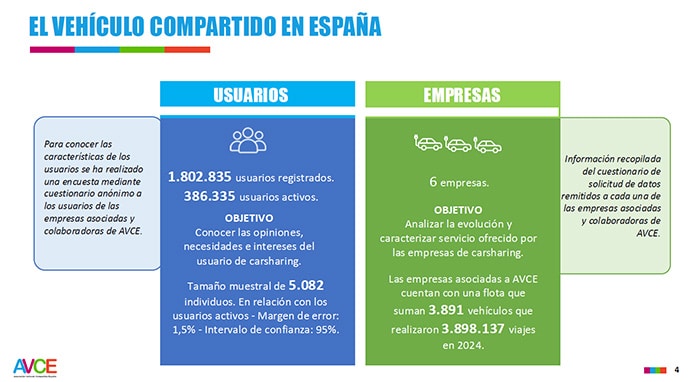Here’s the translation to American English:
—
Reducing the number of vehicles on the road has become a crucial challenge for achieving more efficient and sustainable mobility in Spain. The promotion of public transportation and active mobility is complemented by the development of micromobility options and the use of shared vehicles, known as carsharing. The goal is to decrease citizens’ reliance on private cars.
Recently, the second Shared Mobility Barometer was presented by the Spanish Shared Vehicle Association (AVCE) and the consulting firm Impulso by Pons. This report highlighted that carsharing usage has increased by more than 80% in the last four years, placing Spain among the top five countries in Europe for carsharing adoption.
According to data from six operators associated with AVCE, around 3,898,137 trips were recorded in 2024, using nearly 4,000 vehicles from these companies. These fleets account for 90% of the shared vehicle market, with daily usage three times higher than that of private vehicles, which, on average, spend 90% of their time parked.
The report also analyzes the behavior of users on platforms such as Free2move, Wibble, Guppy, Zity, Voltio, and Getaround, indicating that these mobility options have traveled over 49 million kilometers in the past year. Most users are between the ages of 25 and 55, and one-third of them use the service occasionally.
One of the most significant aspects of carsharing is its relatively new fleet, with an average age of 3.6 years, compared to the 14.2 years for Spain’s private vehicle fleet. This new generation of vehicles not only ensures greater safety due to driving assistants, but most of them are electric or hybrid, making carsharing a more eco-friendly alternative, resulting in a reduction of over 5 million tons of CO2 emissions.
During the report’s presentation, Pere Navarro, General Director of Traffic, emphasized the need to adapt to a population growth that has reached 50 million in spaces designed for ten million fewer. Navarro stressed that future mobility, especially in urban environments, must prioritize safety and air quality. To achieve this, it is essential to reduce the number of vehicles and promote shared mobility alternatives. He also stated that, following the consolidation of bike and scooter rentals, carsharing is here to stay, supported by major automotive groups and insurance companies, reaffirming the commitment to sustainable mobility.
Source: MiMub in Spanish











